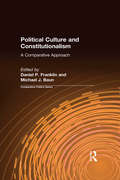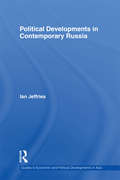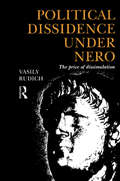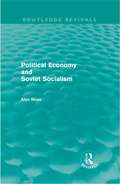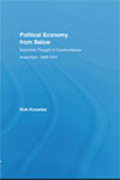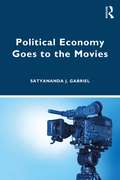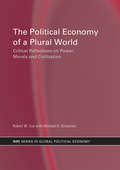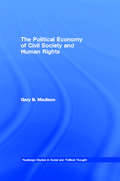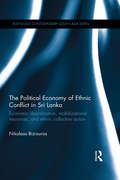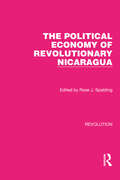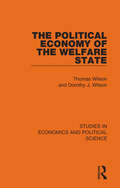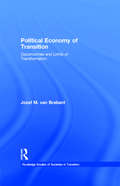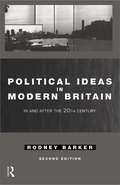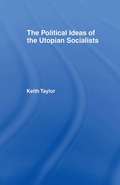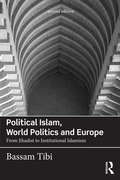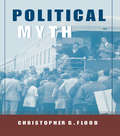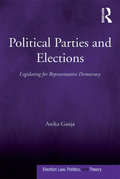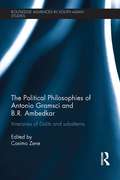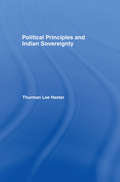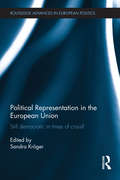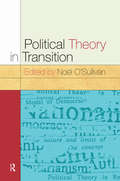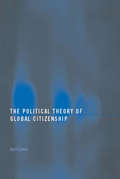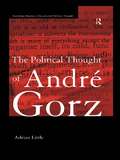Special Collections
Benetech’s Global Certified Accessible Titles
Description: Benetech’s GCA program is the first independent third-party EPUB certification to verify ebook accessibility. By creating content that is born accessible, publishers can meet the needs of all readers. Learn more: https://bornaccessible.benetech.org/
- Table View
- List View
Political Culture and Constitutionalism
by Daniel P. Franklin and Michael J. BaunThis work is a cross-national examination of the relationship between political culture and constitutionalism. The countries studied include Nigeria, Turkey and Japan. Questions explored include whether constitutions must evolve and whether constitutionalism is only a western concept.
Political Developments in Contemporary Russia
by Ian JeffriesThis book provides a comprehensive overview of political developments in Russia since late 2000, following on from where the author’s previous publication, The New Russia, left off. It covers all aspects of politics including the following: the highly centralized nature of power in Russia; central government and presidential elections; regional government and developments in the republics, including unrest in Chechnya and the other Caucasian republics; and human rights. Taking a chronological approach, it shows how politics overall has changed over the period, including how the relationship between Prime Minister (formerly President) Vladimir Putin and President Dmitri Medvedev has worked out. The book continues - and adds to – the overview of developments in the author’s The New Russia (2002), and is the companion volume to Economic Developments in Contemporary Russia (2011) - both published by Routledge.
Political Dissidence Under Nero
by Vasily RudichVasily Rudich examines dissidence under Nero from both historical and psychological perspectives and inquires into the balance of the universal and historically conditioned components of political behaviour. The careers of numerous dissident individuals and their attempts at accomodation to a hostile reality are discussed.
Political Economy and Soviet Socialism
by Alec NoveFirst published in 1979, Political Economy and Soviet Socialism is an integrated selection of papers written over the past 12 years of Russian history, which offers a unique insight into some important and controversial issues. Professor Nove discusses the ideas of some of the leaders of the Russian revolution (Lenin, Trotsky and Bukharin), the political economy of socialism and the problems of the contemporary USSR. The author addresses the role of traditional Russian ideas in shaping the Soviet Union’s social structure and the conceptual problems involved in defining its ruling stratum - whether or not it is a class. He also considers the criteria by which it is reasonable to judge Soviet reality, the performance and prospects of agriculture in communist-ruled Europe, the ability of the Eastern bloc to tackle problems of inflation and the obstacles to economic reform. Looking at the important and original developments of economic thought in the USSR and Eastern Europe, Professor Nove dissects the ideas of the ‘new leftists’ concerning the role of market forces under a feasible socialism. These papers offer essential reading for students of politics, economics and comparative social structure.
Political Economy from Below
by Rob KnowlesCommunitarian anarchism is a generic form of socialism that denies the need for a state or any other authority over the individual from above, and which requires absolute belief that the individual cannot exist outside of a community of others. This book suggests that the communitarian anarchists of the nineteenth century developed and articulated a distinct tradition of economic thought. The period of this study begins with the first major writing of the French communitarian anarchist, Pierre-Joseph Proudhon, in 1840 and ends with the temporary burial of anarchist theorizing at the beginning of the First World War in 1914. However, he tradition of communitarian anarchist economic thought did not end in 1914. The economic thought explored in this book provides a fresh perception of the fragmentation evident in many societies today, especially where there is a substantial "informal economy."
Political Economy Goes to the Movies
by Satyananda J. GabrielPolitical Economy Goes to the Movies provides an introduction to political economy using a wide range of popular films and documentaries as the objects of analysis. The work helps readers to understand and analyze the economic and related political, cultural, and ecological relationships depicted in selected films. This is achieved through the lens of past and present economic theories and in the context of debates over the dynamic influence of economics on individual life chances. Film may have more to teach us about the real world than the abstractions of certain economic theories. A world of income inequality, child labor in mills and mines, local rebellions against land seizures, and wars triggered by economic conflicts provide the context for many films mirroring real world events. Some films depict the interacting and intersecting political, economic, cultural, and ecological contexts within and between variant economic relationships, whereas other films show “catastrophes” such as economic depressions, disruptive social transitions, violent revolutions, and existential environmental degradation – a world in disequilibrium. Films allow us to see a panoply of human social relationships and related problems, even to explore cataclysmic moments in our species life, but not to necessarily see the why of these relationships and problems. Simultaneously, mainstream economics has severe constraints on what can be analyzed. Film exposes this weakness of the mainstream model. Twelve Years a Slave, Trumbo, The Big Short and others are analyzed for their realism by referencing documented historical social events, and behavioral economics provides further data for analyzing the realism of social interaction within the films. Exploring events and contexts absent from the typical economics text or the basic level economics classes, this work is essential reading for students and scholars of political economy in both economics and politics departments, as well as those of pluralist economics and Marxist economics.
The Political Economy of a Plural World
by Michael G. Schechter and Robert CoxBuilding on his seminal contributions to the field, Robert W. Cox engages with the major themes that have characterized his work over the past three decades, and the main topics which affect the globalized world at the start of the twentieth-century. This new volume by one of the world's leading critical thinkers in international political economy addresses such core issues as global civil society, power and knowledge, the covert world, multilateralism, and civilizations and world order. With an introductory essay by Michael Schechter which addresses current critiques of Coxian theory, the author enters into a stimulating dialogue with critics of his work.Timely, provocative and original, this book is a major contribution to international political economy and is essential reading for all students and academics in the field.
The Political Economy of Civil Society and Human Rights
by Gary B. MadisonMadison uses the concept of civil society and his distinctive version of 'communicative rationality' to provide a closely-argued and robust defence of the neo-liberal political and economic tradition. Writing with considerable elegance and humour, the author draws on the hermeneutical and neo-pragmatist traditions, and on a diverse range of evidence and discussion, mainly concerning transitional economies and societies in Eastern Europe and around the world. Providing a systematic analysis of the multi-faceted notion of civil society, this book shows in detail how the three main orders of civil society - the moral-cultural, the political, and the economic - constitute 'spheres of autonomy'. At the same time, it illustrates how these different orders are closely interrelated and interact in a synergetic manner. A unique feature of this study is the way in which the author demonstrates how the logic of the various orders of civil society is, in a way appropriate to the distinct nature of each order, a logic of communicative rationality. The work concludes by arguing that the only sure way of achieving international justice is by the construction of civil society world-wide.
The Political Economy of Ethnic Conflict in Sri Lanka
by Nikolaos BiziourasAt the point of independence in 1948, Sri Lanka was projected to be a success story in the developing world. However, in July 1983 a violent ethnic conflict which pitted the Sinhalese against the Tamils began, and did not come to an end until 2009. This conflict led to nearly 50,000 combatant deaths and approximately 40,000 civilian deaths, as well as almost 1 million internally-displaced refugees and to the permanent migration abroad of nearly 130,000 civilians. With a focus on Sri Lanka, this book explores the political economy of ethnic conflict, and examines how rival political leaders are able to convince their ethnic group members to follow them into violent conflict. Specifically, it looks at how political leaders can influence and utilize changes in the level of economic liberalization in order to mobilize members of a certain ethnic group, and in the case of Sri Lanka, shows how ethnic mobilization drives can turn violent when minority ethnic groups are economically marginalized by the decisions that the majority ethnic group leaders make in order to stay in power. Taking a political economy approach to the conflict in Sri Lanka, this book is unique in its historical analysis and provides a longitudinal view of the evolution of both Tamil and Sinhalese ethnic drives. As such, this interdisciplinary study will be of interest to policy makers as well as academics in the field of South Asian studies, political science, sociology, development studies, political economy and security studies.
The Political Economy of Revolutionary Nicaragua
by Rose J. SpaldingThis book, first published in 1987, is a solid, analytical exploration of the complex dynamics of the revolutionary economic transformation from 1979 to 1986. This collection of eleven essays provides a clear picture of the goals, internal debates, external influences and shifting policy decisions which affected the efforts of the Sandinista government. They help to clarify the dynamics between soaring food prices and falling wages, and explain the complex relationship between the private sector and the state. They also document the policies of the Reagan administration toward the Sandinista government.
The Political Economy of the Welfare State
by Thomas Wilson and Dorothy J. WilsonIn the early 1980s, the welfare state, for too long regarded as a notable contribution to the establishment of a humane social order, had over the previous decade come under increasing attack. Some of its critics, especially in the UK and the USA, maintained that it had failed to deal satisfactorily with the problem of poverty. Others held that it was over-elaborate, created a psychology of dependence and imposed costs that needed to be reduced as part of a policy of general economic recovery. In a number of countries, cuts had already been imposed or were now contemplated. In this situation it was crucially important to direct attention once more to the basic objectives of the various welfare services from a systematic and comparative standpoint. Originally published in 1982, the authors of this book, one an economist and the other a specialist in social administration, subjected these aims to rigorous analysis and discuss the underlying issues of social philosophy. They then attempt to assess the various methods adopted for their attainment in Britain and comment on those adopted in the USA and in some continental European countries. Although the authors reject the more extreme assertion that the welfare state has been a failure, they point to the need to relate some of the policies followed more clearly to the basic objectives. A number of proposals for reform are put forward which would imply some change of emphasis and should permit a simplification of existing over-complex arrangements.
Political Economy of Transition
by Jozef M. van BrabantThis book addresses the policy questions surrounding the challenge of transforming eastern European economies from their planned, administrative past to vibrant market-based entities. Jozef van Brabant considers in turn, the wider set of challenges facing these economies - stabilization, privatization, liberalization, institution building, and developing and maintaining the sociopolitical consensus - before examining the evolving role of the state. Using concrete examples from the eastern European countries throughout, including the Czech Republic and Bulgaria, this work systematically examines, in a society-wide context, the initial conditions of transformation, the policy tasks ahead and the manner in which policies have been pursued.
Political Ideas in Modern Britain
by Rodney BarkerThe rise of the New Right and the collapse of state communism in 1989 has fundamentally changed political thinking in the late twentieth century. Rodney Barker has revised and extended his classic text - Political Ideas in Modern Britain - in the light of these changes. His accessible account of political thinking in Britain since the 1880s now includes detailed analysis of:* the demise of traditional conservatism and socialism* the rise and decline of the New Right* the growth of feminism, liberalism and pluralismPolitical Ideas in Modern Britain charts the changing intellectual landscape of political thinking, illustrating how contemporary political thought is both rooted in tradition and a radical transformation of it. Whether the future is liberal, communitarian, pluralist, or simply uncertain, this is an essential guide for students of British politics.Rodney Barker is Senior Lecturer in Government at the London School of Economics and Political Science.
Political Ideas of the Utopian Socialists
by Keith TaylorFirst Published in 1982. Routledge is an imprint of Taylor & Francis, an informa company.
Political Islam, World Politics and Europe
by Bassam TibiThe new and updated edition of Political Islam, World Politics and Europe focusses on the shift within political Islam, in light of 9/11 and the events of the Arab Spring, from a jihadist struggle, to institutional Islamism. Refuting what has often been referred to by commentators as the ‘moderation,’ of Islamism, the second edition of this book introduces the concept of ‘institutional,’ Islamism, a process which Tibi argues was accelerated in the aftermath of the Arab Spring. Both jihadist and institutional Islamism pursue the same goal of an Islamist state, but disagree fundamentally on the strategy for achieving it. Whilst jihadism is committed to the idea of a (violent) Islamic world revolution, institutional Islamism embraces political institutions as a means to an end. Turning to the events of the Arab Spring in Tunisia, Libya and Egypt this book attempts to determine whether an abandonment of violence is enough to underpin a shift to genuine democracy. Analysing the fall of Morsi in particular, Tibi questions what lessons can be learnt from his presidency, and argues that this event will not change the overall trend of development from jihadism to institutional Islamism A timely addition to existing literature, this book will be of interest to students and scholars studying Middle Eastern and European Politics, Political Islam and International Relations.
Political Myth
by Christopher FloodFirst Published in 2002. Routledge is an imprint of Taylor & Francis, an informa company.
Political Parties and Elections
by Anika GaujaPolitical Parties and Elections presents a comparative analysis of the ways in which advanced industrial democracies seek to regulate the activities of political parties in electoral contests. Actual political practice suggests that parties are crucial actors in democratic elections, yet the nature and extent to which parties are regulated, or even recognized, as participants in the electoral process varies greatly among nations. Author Anika Gauja analyzes the electoral laws of five key common law democracies with similar parliamentary and representative traditions, similar levels of economic and political development, yet with significantly different electoral provisions: the United States, the United Kingdom, Canada, Australia, and New Zealand. Using the relationship between law and politics as a lens, the book focuses specifically on the ways in which these jurisdictions seek to regulate the behavior of their political parties as the product of a broader normative vision of how representative democracy ought to function. In its subject matter, comparative scope, and interdisciplinary theoretical framework, this book examines not only electoral law but also ancillary legislation such as funding regulations, associations and corporations law, and constitutional provisions. It also analyzes the case law that guides the interpretation of this legislation. Political Parties and Elections represents an innovative body of research, comparing for the first time the electoral-legal regimes of a significant number of common law nations.
The Political Philosophies of Antonio Gramsci and B. R. Ambedkar
by Cosimo ZeneBridging two generations of scholarship on social inequality and modern political forms, this book examines the political philosophies of inclusion of subalterns/Dalits in Gramsci and Ambedkar’s political philosophies. It highlights the full range of Gramsci’s ‘philosophy of praxis’ and presents a more critical appreciation of his thought in the study of South Asian societies. Equally, Ambedkar’s thought and philosophy is put to the forefront and acquires a prominence in the international context. Overcoming geographical, cultural and disciplinary boundaries, the book gives relevance to the subalterns. Following the lead of Gramsci and Ambedkar, the contributors are committed, apart from underscoring the historical roots of subalternity, to uncovering the subalterns’ presence in social, economic, cultural, educational, literary, legal and religious grounds. The book offers a renewed critical approach to Gramsci and Ambedkar and expands on their findings in order to offer a present-day political focus into one of the most crucial themes of contemporary society. This book is of interest to an interdisciplinary audience, including political theory, post-colonial studies, subaltern studies, comparative political philosophy, Dalit studies, cultural studies, South Asian studies and the study of religions.
Political Philosophy After 1945
by Alan HaworthBy the mid-twentieth century interest in political philosophy had dwindled, with one writer even pronouncing the subject ‘dead’. Things were to change in 1971, when the subject experienced a renaissance with the publication of John Rawls’s A Theory of Justice. The story didn’t end with Rawls however, as other avenues through which to approach the subject became available. In Political Philosophy After 1945 Alan Haworth tells the story of political philosophy from the mid-twentieth century to the early twenty-first. First, he considers why the subject should have become marginalised by mainstream philosophical movements such as logical positivism and the ‘ordinary language philosophy’ inspired by Wittgenstein. Subsequent chapters explain the fundamentals of Rawls’s theory, and then compare and contrast his contribution with that of other philosophers from across the political spectrum. These are followed by chapters in which alternative approaches are examined. There are in-depth accounts of works by Hannah Arendt and Alasdair MacIntyre, as well as an evaluation of the claim that political philosophy exemplifies the pursuit of a moribund ‘Enlightenment project’. Throughout the book, Haworth strikes a balance between historical perspective and close analysis of major texts, and he is careful to emphasise the relevance of theoretical issues to questions which arise beyond theory. As such, Political Philosophy After 1945 is essential reading for students and scholars of political philosophy, but also serves as an introduction for students from across the Humanities and Social Sciences approaching the topic for the first time.
The Political Philosophy of Hannah Arendt
by Maurizio Passerin d'EntrèvesFirst published in 1993. Routledge is an imprint of Taylor & Francis, an informa company.
Political Principles and Indian Sovereignty
by Thurman Lee Hester, Jr.Political Principles and Indian Sovereignty examines the connection between the well being of Indian people, the sovereignty of Indian Nations and the democratic principles on which the United States was founded. Problems faced by Native Americans in health, education and general welfare are linked to the loss of sovereignty caused by the U.S. Government.
Political Representation in the European Union
by Sandra KrögerIn recent years the financial and economic crisis of 2008–9 has progressed into an equally important political and democratic crisis of the EU. These troubled times have set the framework to re-assess a number of important questions in regard to representative democracy in the EU, such as the normative foundation of political representation, the institutional relationship between representatives and represented, the link between democracy and representation and new arenas and actors. This book examines the diverse avenues through which different sorts of actors have expressed their voices during the Euro crisis and how their various interests are translated into the decision-making process. It offers a state-of- the-art assessment of what political representation means in this context as well as a contribution to the ‘representative turn’ in democratic theory. The authors address three key themes: • The main actors and channels of political representation in the EU. • Interlocking levels of representation in the EU and the way in which national and supranational representation works. • How the European institutional system represents EU citizens through law and administration. Focusing on the importance of representation in the legitimation of democracy, this book will be of interest to students and scholars of European Union politics, European studies, democratic theory, representation studies, civil society and transnational democracy.
Political Theory In Transition
by Noel O'SullivanDuring the past two decades there has been increasing dissatisfaction with established political categories, on the grounds that they no longer fit many of the facts of contemporary life, or adequately express many contemporary political ideals. Political Theory in Transition explores the principal reasons for this dissatisfaction and outlines some of the most influential responses to it.Key features of this textbook:* covers many of the important areas in political theory including: Communitarianism; Identity; Feminism; Liberalism; Citizenship; Democracy; Power; Authority; Legitimacy; Nationalism; Globalization; and the Environment* includes chapters written by some of the foremost authorities in the field of political theory* divided into four useful sections, beginning with the concept of the individual, and progressing to beyond the nation-state.
The Political Theory of Global Citizenship
by April CarterThis book provides a comprehensive overview of the meaning of cosmopolitanism and world citizenship in the history of Western political thought, and in the evolution of international politics since 1500.Providing an invaluable overview of earlier political thought, recent theoretical literature and current debates, this book also discusses recent developments in international politics and transnational protest. It will be of great interest to those specialising in political theory, International Relations and peace/conflict studies. It will also interest those already acting as global citizens.
The Political Thought of Andre Gorz
by Adrian LittleAndre Gorz is one of the most important contemporary socialist thinkers. He has acquired a reputation as an iconoclastic theorist who poses radical questions about the future of the Left. This is the first full length assessment of his work which critically evaluates all of his writings from the 1950s to the 1990s.
